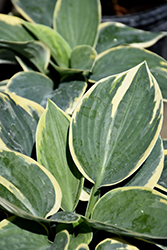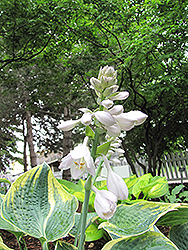Height: 28 inches
Spacing: 30 inches
Sunlight:
![]()
![]()
Hardiness Zone: 2a
Other Names: Plantain Lily, Funkia
Description:
This variety starts with blue-green pointy to heart shaped foliage; the butter-yellow edge changes to white in time; provides beautiful texture and contrast to other plants; near white flowers in late spring or early summer
Ornamental Features
Sugar Daddy Hosta features dainty spikes of creamy white tubular flowers rising above the foliage from late spring to early summer. Its attractive glossy heart-shaped leaves remain bluish-green in colour with distinctive buttery yellow edges and tinges of white throughout the season.
Landscape Attributes
Sugar Daddy Hosta is a dense herbaceous perennial with tall flower stalks held atop a low mound of foliage. Its relatively fine texture sets it apart from other garden plants with less refined foliage.
This is a relatively low maintenance plant, and is best cleaned up in early spring before it resumes active growth for the season. Gardeners should be aware of the following characteristic(s) that may warrant special consideration;
- Insects
Sugar Daddy Hosta is recommended for the following landscape applications;
- Mass Planting
- Border Edging
- General Garden Use
- Groundcover
Planting & Growing
Sugar Daddy Hosta will grow to be about 24 inches tall at maturity, with a spread of 3 feet. When grown in masses or used as a bedding plant, individual plants should be spaced approximately 30 inches apart. Its foliage tends to remain dense right to the ground, not requiring facer plants in front. It grows at a slow rate, and under ideal conditions can be expected to live for approximately 10 years. As an herbaceous perennial, this plant will usually die back to the crown each winter, and will regrow from the base each spring. Be careful not to disturb the crown in late winter when it may not be readily seen!
This plant does best in partial shade to shade. It prefers to grow in average to moist conditions, and shouldn't be allowed to dry out. It is not particular as to soil type or pH. It is somewhat tolerant of urban pollution. This particular variety is an interspecific hybrid. It can be propagated by division; however, as a cultivated variety, be aware that it may be subject to certain restrictions or prohibitions on propagation.
Disclaimer - This resource is provided for informational purposes only and does NOT reflect current availability. Inventory varies seasonally, so we cannot guarantee that every plant will be in stock at all times - please contact your favourite GardenWorks location directly for current availability. It does not include our entire inventory of plants, so be sure to visit GardenWorks to see varieties that may not be represented on this list.


